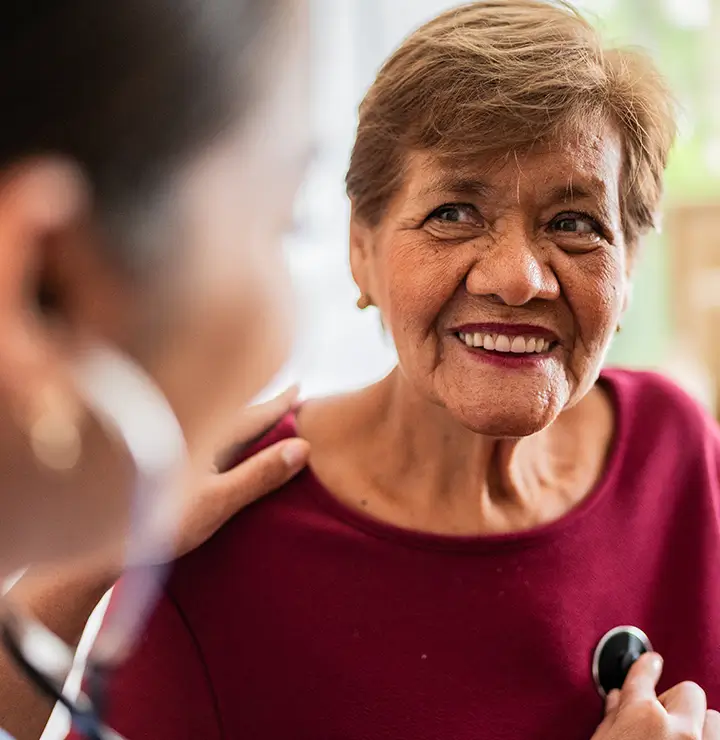
Women’s Heart Services
If you’re a woman, your heart disease symptoms expose a bias in medical research. We pinpoint and treat what’s often missed in conventional heart care.
We recognize that your physiology, heart disease risk factors, diagnostic tests, and treatment options are utterly unique.
Our approach to Women’s Heart Services
Did you know that women don’t have the same heart disease symptoms as men? This has led to missed diagnoses and the rise of heart disease as the primary cause of death in women.
We faithfully follow the UCI motto to discover, teach and heal. These guiding directives shaped the Women’s Heart program, letting us grow a historically neglected area of care. Our approach is highly empathetic, collaborative and holistic.
To address the complexities of your heart health, we operate in a robust, multi-physician team environment. We call on each other’s expertise regularly, discussing your case through the lens of each specialty. Instead of just one doctor deciding what you need, you’ll benefit from years of clinical experience from many seasoned physicians.
Our team includes specially trained cardiologists with expertise in women’s heart health:
- Imaging specialists
- Vascular, endovascular and cardiothoracic surgeons
- Nurse practitioners
- Nurses
- Dietitians
- Exercise physiologists
Come in for an evaluation if you have:
- Family history of heart disease
- Abnormal stress test, followed by a normal angiogram
- Chest pain or chest pressure
- Jaw pain
- Nausea
- Pain in the left arm or shoulder
- Shortness of breath with exertion
- Unusual and unexplained fatigue
Looking for more options?
View all cliniciansWhy choose UCI Health for Women’s Heart Services?
We’re passionate about getting you accurate, timely care
The most common heart disease symptom you share with men is chest pain. But other signs of heart attack in women, like plaque buildup, vary from the norm.
In our core practice at Women’s Heart Services, we:
- recognize symptoms that traditional programs often miss
- test for uncommon risk factors specific to women
- offer innovative treatments, and
- focus on early detection to prevent future cardiac events
Many women have a hard-to-detect condition called coronary microvascular disease
If you’re not working with women’s heart health experts, in 50% of you, that can lead to a serious misdiagnosis. You may have a form of heart disease that an angiogram alone won’t catch. If you’re misdiagnosed, you won’t respond to standard treatment.
Coronary microvascular disease is becoming more prevalent and requires sensitive tests. We use two powerful tools to identify microvascular disease, coronary reactive testing and EndoPAT™.
Our holistic approach includes medication and beyond
In the past decade, the new medications that have become available are so powerful we can sometimes avoid surgery. We also use minimally invasive techniques wherever possible to lower infection and other risks from major surgery.
Beyond traditional treatment, lifestyle choices and stress are major contributors to heart disease. The mind-body connection is real, and we take a whole patient approach to capture what doesn’t show up on a medical test.
We use an integrative approach to address what we can’t quantify. While working with us, you may also benefit from visiting The UCI Health Susan Samueli Integrative Health Institute. Our Preventive Cardiology Program doctors can work with you to create a plan that supports healthy lifestyle choices.
WomenCertified® recognizes UCI Medical Center as one of the "Best Hospitals for Patient Experience in Heart Care"
A great patient experience is important to us. We are committed to helping you enjoy life more fully and take a patient-centered approach to care.

Get the expertise you deserve
Heart disease is urgent – it’s the leading cause of death in women in the US.
Let our experts spot and treat the nuances of your heart condition.
Call 714-456-6699 now to schedule your first consult, or

Find a Cardiology Clinical Trial
Talk to your doctor to see if a cardiology clinical trial is right for you.
Featured Blog Posts

What you should know about heart disease and pregnancy

How heart attacks differ in women





